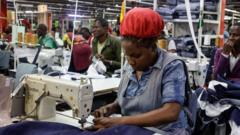The recent announcement of a staggering 50% import tariff by President Trump has sent shockwaves through the textile sector in Lesotho, raising concerns about the future of the African Growth and Opportunity Act (Agoa). This legislation, which has historically facilitated duty-free access for African goods in the U.S., now faces uncertainty, leading to fears of economic destabilization across the continent.
Impacts of Trump's Tariffs on US-Africa Trade Relations

Impacts of Trump's Tariffs on US-Africa Trade Relations
The new tariffs imposed by President Trump could threaten the stability of trade agreements like Agoa, significantly affecting the economies of African nations such as Lesotho.
The textile industry in Lesotho is bracing for turmoil as news broke of a 50% import tariff on its exports to the U.S., a move announced by President Trump. Teboho Kobeli, founder of Afri-Expo Textiles, expressed grave concerns for the 2,000 individuals he employs, anticipating a crippling effect on their livelihoods as prices for their goods are set to rise.
Lesotho has thrived under the African Growth and Opportunity Act (Agoa), a two-decade-old U.S. initiative aimed at enhancing economic relations and promoting trade over aid across Africa. Designed to foster industrial growth and employability, the act has been pivotal in generating hundreds of thousands of jobs, particularly in the textile arena. Yet, with Trump's administration imposing tariffs ranging from 10% to 50% on diverse African exports, Agoa’s viability now hangs in the balance.
The confusion surrounding these policies has been palpable across Africa. While South Africa's officials assert that Trump's tariffs undermine Agoa's benefits, claiming a nullification of preferential treatment, Kenyan officials remain optimistic, arguing that the act is still in effect until its current expiration date in September 2025.
The hope of renewing Agoa is dimming as Trump's tariffs overshadow any prospects of bipartisan support for the act, which was due for renewal later this year. Historically, Agoa has provided substantial economic advantages, with two-way trade reaching $47.5 billion in 2023. Yet, the drastic tariffs imposed spur fears that a "death knell" is imminent for manufacturing in Lesotho, as warned by Mukhisa Kituyi, a former high-ranking trade official.
Amidst these changes, exporters in Kenya indicate they may still cope under the new tariff landscape, given their lower rates compared to countries like Lesotho. However, the long-term predictions remain grim. The impact of sullying Agoa could reach beyond mere economic metrics; it could substantially diminish U.S. influence in the region as other nations, particularly China, aggressively expand their trading foothold in Africa.
With Agoa facing possible dissolution, a comprehensive response to forge a continent-wide free-trade area may become paramount for African nations. In a political climate where trade agreements are increasingly influenced by domestic policies in the U.S., the future for countries reliant on the American market appears precarious and uncertain.





















